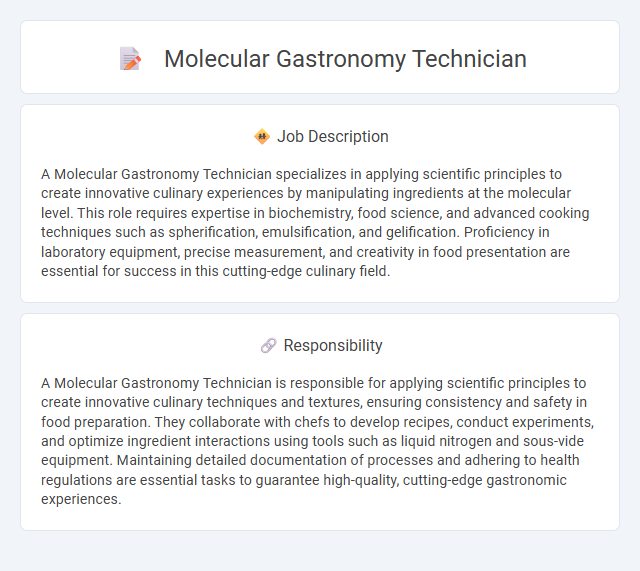
A Molecular Gastronomy Technician specializes in applying scientific principles to create innovative culinary experiences by manipulating ingredients at the molecular level. This role requires expertise in biochemistry, food science, and advanced cooking techniques such as spherification, emulsification, and gelification. Proficiency in laboratory equipment, precise measurement, and creativity in food presentation are essential for success in this cutting-edge culinary field.
Individuals with a strong passion for science and culinary arts will likely find the role of a molecular gastronomy technician suitable, as it requires precision and creativity in combining food ingredients. Those who enjoy experimenting and have patience to conduct detailed processes might have a higher probability of success in this job. Candidates lacking interest in scientific methods or experimental cooking may find this career less appropriate for their skills and preferences.
Qualification
A Molecular Gastronomy Technician typically requires a strong background in food science, chemistry, or culinary arts, often demonstrated through a bachelor's degree in one of these fields. Proficiency in laboratory techniques, understanding of food molecular composition, and experience with innovative cooking technologies are essential qualifications. Certifications in food safety and specialized training in molecular gastronomy tools enhance a candidate's expertise and employability in this niche culinary sector.
Responsibility
A Molecular Gastronomy Technician is responsible for applying scientific principles to create innovative culinary techniques and textures, ensuring consistency and safety in food preparation. They collaborate with chefs to develop recipes, conduct experiments, and optimize ingredient interactions using tools such as liquid nitrogen and sous-vide equipment. Maintaining detailed documentation of processes and adhering to health regulations are essential tasks to guarantee high-quality, cutting-edge gastronomic experiences.
Benefit
A Molecular Gastronomy Technician may likely experience benefits such as enhanced creativity in food preparation and access to cutting-edge culinary technology. This role probably offers opportunities to work closely with chefs to innovate recipes, potentially leading to career growth in the culinary arts. Exposure to a scientific approach in cooking could improve technical skills and increase employability in specialized gastronomy sectors.
Challenge
Working as a molecular gastronomy technician likely involves tackling complex challenges related to blending scientific principles with culinary creativity. The role probably demands precise experimentation with food textures and flavors to achieve innovative dining experiences. Success in this field may depend on adaptability and problem-solving skills to overcome technical and conceptual hurdles.
Career Advancement
A Molecular Gastronomy Technician develops innovative culinary techniques by applying scientific principles to cooking, enhancing food texture and flavor profiles. Career advancement opportunities include roles such as Research Chef, Food Scientist, or Culinary Innovation Manager, often requiring expertise in chemistry and sensory analysis. Gaining experience in laboratory equipment, food safety regulations, and collaboration with chefs and researchers accelerates progression to senior positions in food technology and product development.
 kuljobs.com
kuljobs.com